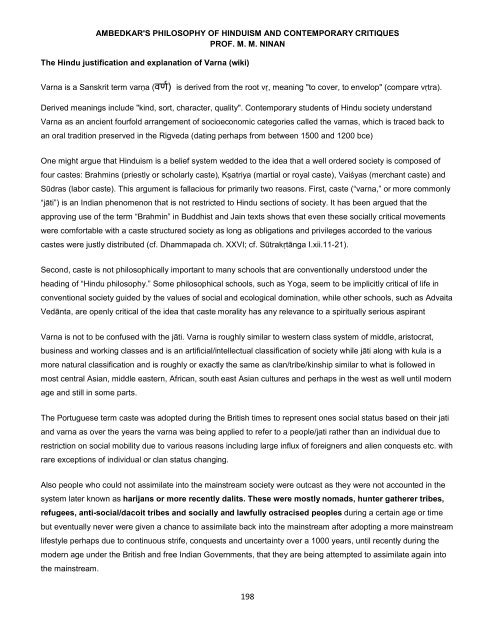Ambedkar-Philosophy of Hinduism
Create successful ePaper yourself
Turn your PDF publications into a flip-book with our unique Google optimized e-Paper software.
AMBEDKAR'S PHILOSOPHY OF HINDUISM AND CONTEMPORARY CRITIQUES<br />
PROF. M. M. NINAN<br />
The Hindu justification and explanation <strong>of</strong> Varna (wiki)<br />
Varna is a Sanskrit term varṇa (वण) is derived from the root vṛ, meaning "to cover, to envelop" (compare vṛtra).<br />
Derived meanings include "kind, sort, character, quality". Contemporary students <strong>of</strong> Hindu society understand<br />
Varna as an ancient fourfold arrangement <strong>of</strong> socioeconomic categories called the varnas, which is traced back to<br />
an oral tradition preserved in the Rigveda (dating perhaps from between 1500 and 1200 bce)<br />
One might argue that <strong>Hinduism</strong> is a belief system wedded to the idea that a well ordered society is composed <strong>of</strong><br />
four castes: Brahmins (priestly or scholarly caste), Kṣatriya (martial or royal caste), Vaiśyas (merchant caste) and<br />
Sūdras (labor caste). This argument is fallacious for primarily two reasons. First, caste (“varna,” or more commonly<br />
“jāti”) is an Indian phenomenon that is not restricted to Hindu sections <strong>of</strong> society. It has been argued that the<br />
approving use <strong>of</strong> the term “Brahmin” in Buddhist and Jain texts shows that even these socially critical movements<br />
were comfortable with a caste structured society as long as obligations and privileges accorded to the various<br />
castes were justly distributed (cf. Dhammapada ch. XXVI; cf. Sūtrakṛtānga I.xii.11-21).<br />
Second, caste is not philosophically important to many schools that are conventionally understood under the<br />
heading <strong>of</strong> “Hindu philosophy.” Some philosophical schools, such as Yoga, seem to be implicitly critical <strong>of</strong> life in<br />
conventional society guided by the values <strong>of</strong> social and ecological domination, while other schools, such as Advaita<br />
Vedānta, are openly critical <strong>of</strong> the idea that caste morality has any relevance to a spiritually serious aspirant<br />
Varna is not to be confused with the jāti. Varna is roughly similar to western class system <strong>of</strong> middle, aristocrat,<br />
business and working classes and is an artificial/intellectual classification <strong>of</strong> society while jāti along with kula is a<br />
more natural classification and is roughly or exactly the same as clan/tribe/kinship similar to what is followed in<br />
most central Asian, middle eastern, African, south east Asian cultures and perhaps in the west as well until modern<br />
age and still in some parts.<br />
The Portuguese term caste was adopted during the British times to represent ones social status based on their jati<br />
and varna as over the years the varna was being applied to refer to a people/jati rather than an individual due to<br />
restriction on social mobility due to various reasons including large influx <strong>of</strong> foreigners and alien conquests etc. with<br />
rare exceptions <strong>of</strong> individual or clan status changing.<br />
Also people who could not assimilate into the mainstream society were outcast as they were not accounted in the<br />
system later known as harijans or more recently dalits. These were mostly nomads, hunter gatherer tribes,<br />
refugees, anti-social/dacoit tribes and socially and lawfully ostracised peoples during a certain age or time<br />
but eventually never were given a chance to assimilate back into the mainstream after adopting a more mainstream<br />
lifestyle perhaps due to continuous strife, conquests and uncertainty over a 1000 years, until recently during the<br />
modern age under the British and free Indian Governments, that they are being attempted to assimilate again into<br />
the mainstream.<br />
198


















